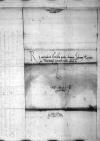Letter #5711
Sigismund I Jagiellon to Ioannes DANTISCUSWarsaw, 1544-04-08
| received Heilsberg (Lidzbark Warmiński), 1544-04-12 Manuscript sources:
Auxiliary sources:
| ||||||||||
Text & apparatus & commentaryPlain textText & commentaryText & apparatus
 BNW, BOZ, 953, f. 230v
BNW, BOZ, 953, f. 230v Reverendo in Christo Patri, domino Iohanni episcopo Warmiensi, sincere nobis dilecto
 BNW, BOZ, 953, f. 230r
BNW, BOZ, 953, f. 230r Reverende in Christo Pater, sincere nobis dilecte.
Accepimus litteras Paternitatis Vestrae, in quibus nos promissi
de
Cupimus Paternitatem Tuam bene valere.
Dat(ae) or Dat(um)⌈Dat(ae)Dat(ae) or Dat(um)⌉
Ad mandatum s(erenissimae) or s(acrae)⌈s(erenissimae)s(erenissimae) or s(acrae)⌉ regiae maiestatis proprium

